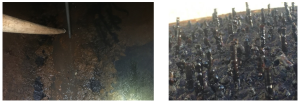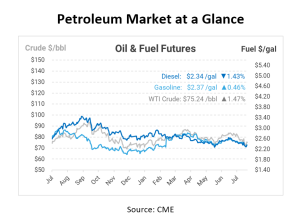
Top Signs Your Fuel Storage Tank Needs Cleaning and How to Get It Done
Do you know what’s in your fuel tank?
According to a 2016 EPA report, 83% of randomly sampled fuel tanks demonstrate moderate to severe corrosion – and very rarely does the owner know about the problem.
So, how do you know if your tank is pumping sludge, contaminants, and water into your business-critical equipment?
Over time, various contaminants like water, sediment, microbes, and rust can accumulate in the tank, leading to degraded fuel quality and potential damage to your equipment. Ensuring your fuel storage tanks are clean not only extends their lifespan but also maintains the efficiency and reliability of the machinery that depends on them.
In today’s article, we list the top five signs that your fuel storage tank needs cleaning and offer tips on how to maintain it effectively.
-
Frequent Filter Changes
When you notice it’s taking longer to fill each vehicle at the fuel pump, it’s time to change your fuel filter. The filter is meant to be changed on a regular basis, but if you notice you’re changing it more frequently than normal – or you have folks removing the filter to fuel faster (it happens!) – then you might have a fuel quality problem that needs addressing.
-
Water in Tank
Water accumulation at the bottom of your tank is a serious issue. Water can enter through condensation, leaks, or during refueling. It promotes microbial growth and accelerates corrosion, leading to tank damage and fuel contamination. When your fuel driver drops a load of fuel, they can use water-finding paste when sticking the tank, or you may have an ATG that measures water levels at the bottom of the tank.
-
Cloudy Fuel or Strong Odors
If the fuel you dispense out of the nozzle is cloudy and unclear, it’s probably time to have your fuel tested and consider a tank cleaning or polishing. Contaminants can include water, microbial growth, dirt, and rust, all of which can degrade the quality of your fuel and harm your equipment. A strong, unpleasant odor emanating from your fuel storage tank is another indication of microbial contamination. Microbes produce acids and gases that can cause foul smells and accelerate tank corrosion.

-
Visible Corrosion or Rust
Corrosion or rust on the tank’s exterior or interior is a clear indicator that your tank needs immediate attention. Rust not only weakens the tank structure but also contaminates the fuel.

-
Reduced Equipment Performance
Ideally, you can address a fuel tank based on #1-#4, to prevent damage to your equipment. However, some businesses wait too long to check on their fuel quality, leading to reduced equipment performance. Poor fuel quality can manifest in your equipment a few different ways, including frequent fuel injector replacements, reduced fuel efficiency from deposits, and increased DEF consumption due to poor combustion.
The Solution
So what can you do to address poor fuel quality?
Regular cleaning and maintenance of your fuel storage tanks are crucial for ensuring fuel quality, protecting your equipment, and maintaining operational efficiency. By staying vigilant and addressing the signs of contamination promptly, you can avoid costly repairs and downtime, keeping your operations running smoothly.
Among the steps companies can take to proactively prevent engine damage:
- Implement a scheduled maintenance program that includes tank inspections. Inspect your tank regularly for signs of corrosion, either using your site personnel or a tank inspection company. If any external signs of damage or wear are found, have them addressed promptly. Regularly replace filters to ensure clean fuel is reaching your engines.
- Regularly sample and test your fuel quality. Many customers implement an annual, bi-annual, or quarterly fuel sampling approach to stay on top of their needs. If the sample is clear, no action is needed; however, a poor sample may necessitate further analysis or a tank cleaning.
- Treat the tank when issues are found. If you have a known fuel quality problem, talk to a fuel partner to have the issues fixed. If the only problem is water, then a company can pump out the bottom layer of water. Often, water creates other problems, so you may need a complete fuel polishing and tank cleaning combination to treat the problem. Work with your fuel equipment partner to determine which approach is the right solution for your need.
- Treat your fuel for on-going cleanliness. Many companies are finding that keeping up with their diesel fuel tank cleanliness regimen is time-consuming and difficult. If that’s the case, a proactive additive such as CLEAN365 can help keep your fuel clean over the long-term, preventing the build-up of water and microbial growth and cleaning your equipment engines to restore lost power.
Innovative Fuel Quality Solutions
Keeping fuel and fueling systems clean and efficient protects the environment from contamination, prevents costly equipment downtime, restores fuel economy, and reduces maintenance costs. Implementing a robust Fuel Quality Program can significantly minimize operational headaches and lower the overall cost of fuel.
Mansfield Energy services thousands of commercial, industrial, and government tanks across the US, providing the scale and expertise to ensure your tanks are treated right every time. With a network of local qualified technicians, Mansfield can help you get the help you need quickly, reliably, and at a fair price.
If your business is operating bulk fuel tanks across the US, it’s time to get serious about equipment maintenance and upkeep. Get better data, better service, and better control by choosing Mansfield as your fuel tank repair & maintenance partner. Get in touch today!

This article is part of Daily Market News & Insights
Tagged:
MARKET CONDITION REPORT - DISCLAIMER
The information contained herein is derived from sources believed to be reliable; however, this information is not guaranteed as to its accuracy or completeness. Furthermore, no responsibility is assumed for use of this material and no express or implied warranties or guarantees are made. This material and any view or comment expressed herein are provided for informational purposes only and should not be construed in any way as an inducement or recommendation to buy or sell products, commodity futures or options contracts.





